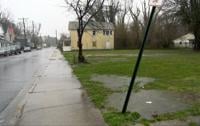CAMBRIDGE, MD. - In a bid to combat the city's housing crisis, officials in Cambridge are spearheading an initiative that could mark a pioneering move in Maryland. The proposed program centers around the establishment of a land bank, envisioned as the first of its kind in the state.
The concept behind the land bank is to address the commonness and amount of vacant properties and buildings that plague Cambridge. City leaders estimate that there are over 1,000 vacant properties, contributing to the housing shortage gripping the area.
"The Land Bank Authority of Cambridge (LBAC) is a non-profit organization affiliated with, but not necessarily controlled by, the city, and its purpose is to buy and sell real estate to return it to productive use," explained Cambridge City Manager Tom Carroll.
Under the proposed scheme, homes facing foreclosure or abandonment would undergo rehabilitation by contracted professionals. Similarly, vacant land parcels would be earmarked for construction to be built on. To kickstart the initiative, city officials plan to allocate $1 million to LBAC, with hopes the program will recouping some of the investment through property sales. Additionally, LBAC would actively seek grants to supplement funding for its endeavors.
"We have purchased some vacant parcels which we are setting aside," says Carroll. He added, "We've also purchased a couple of existing buildings, one of which has been torn down, one of which has been rehabbed, and so we're working on the plans for that."
The land that has been purchased has been around the Pine St. neighborhood. Specifically the empty plots of land around 920 Pine St. and the area around 645 Washington St.
Local homeowner Shay Lewis-Sisco echoed the urgency of addressing the housing needs of Cambridge residents. She expressed hope that the new housing units would prioritize locals.
"I would be totally in support if this initiative was directed to the residents here in Cambridge, Maryland. We have a lot of housing here in the city of Cambridge, some of which are privately owned and those houses are not up to building codes," Lewis-Sisco remarked.
The city of Cambridge has scheduled a public hearing on March 25 to deliberate on the proposal. During the meeting, there is a chance council could vote. If approved, a Land Bank Board comprising seven members would be established to oversee the program's implementation.


